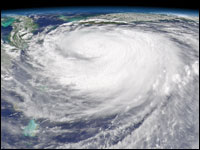
Disasters — be they man-made or natural, like Hurricane Sandy — showcase the best in people. Neighbor helps neighbor like never before, people share what they have, and assistance comes from unexpected places.
They also showcase people at their worst — looters, scammers and other lowlifes emerge and heartlessly seek to profit from the victims.
Then there are businesses that do the same.
Here’s a sad example of this. On Nov. 1, during the height of the hurricane, a broken gas main caused a massive fire in the town of Mantoloking, N.J., population 296. This seaside town, situated on a barrier peninsula, was a great location for a summer cottage and a wretched place to have a hurricane.
Evacuation Preparation
One family had a cottage in town — a second home to rent out or host visitors — burned to the ground by the fire. The house the family lived in for half the year was threatened by another gas main break. In the midst of the disaster, the family prepared to leave town. Part of those preparations each year was to shut off the cable service. When they returned the following spring, they would start it again.
As the fire raged and the winds roared, the agent said that to cancel the service the family would need to return their cable box and equipment. The mother of the family explained that might not be possible — the area’s infrastructure was devastated, authorities were having a hard time reaching the gas main break because of the hurricane, and an explosion could destroy their house at any time.
The response: “We’re very sorry, but the price of the equipment will be charged to your account if you’re unable to return it.”
You can probably guess the perpetrators. Comcast, the perpetual punching bag of customer service pundits, again out-did itself. A pioneer in the realm of social media-enabled service with Comcast Cares, it also again ran foul of social media when the homeowner’s son, Seth Clifford, blogged about his family’s experience and Comcast’s callous response to their perilous situation.
Learning Experience
I’m not going to bag on Comcast. To paraphrase comedian Todd Barry, mocking Comcast service isn’t as easy as shooting fish in a barrel — it’s as easy as looking at fish in a barrel. Instead, let’s look at what went haywire in this incident.
First off, your service processes don’t exist in a vacuum. They co-exist with the rest of the world, and that may include parts of the world being hit by hurricanes, fires, floods or earthquakes. These events are likely to interfere with your standard service processes. Tell your agents to be aware of these events, and work up some contingencies for them so they’re not operating in the dark.
Second, realize that service calls under such conditions are going to involve someone who’s either terrified, traumatized or in a very tender space. Defaulting back to the script is a great way to alienate them at the very moment when they can benefit from some sympathy and some accommodation. If you handle the situation well, you leave an impact that can create a customer for life. Handle it badly and you drive that person — and the many others who hear that person’s story — away for life.
Third, be prepared to flex your processes. Comcast’s cable boxes are not inexpensive, but for customers who have had their homes destroyed, the demand to get the boxes back or face a bill is heaping insult on top of injury. I’ve never been in this position, but I’m going to guess that if my home was destroyed, writing a check to pay for my cable boxes would be about the last item on the list. Why not waive the fees? If you absolutely must get the cost of the boxes back, why not apply a monthly charge when the customers renews after getting back on his or her feet in a new home? That assumes the customer wants to do business with you ever again, which may indeed be a stretch for Comcast customers.
Service organizations are judged not by how well they handle the ordinary, but by how well they handle the exceptions. A disaster like Hurricane Sandy is perhaps the biggest exception of all. Is your service organization up to the task of handling it?





















































